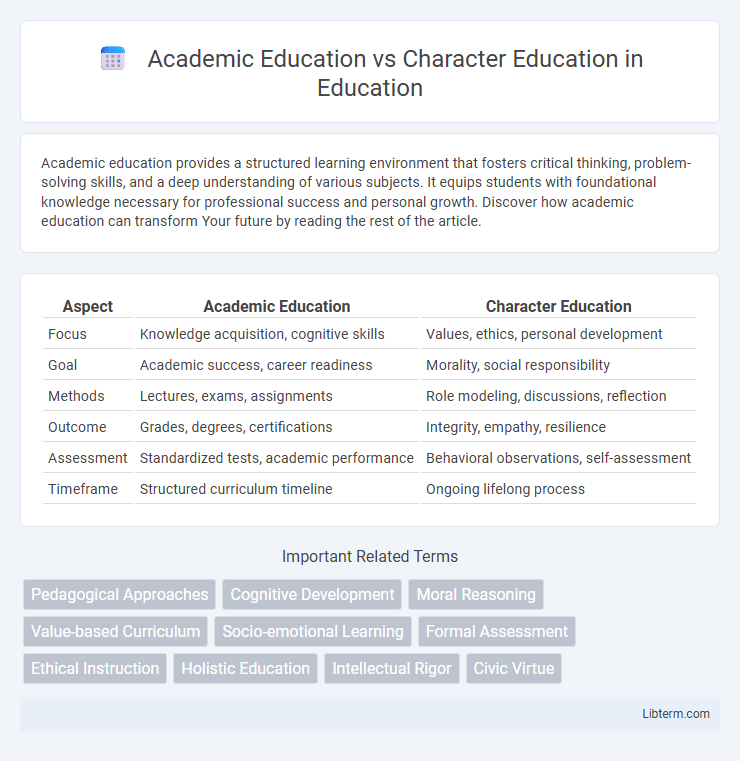Academic education provides a structured learning environment that fosters critical thinking, problem-solving skills, and a deep understanding of various subjects. It equips students with foundational knowledge necessary for professional success and personal growth. Discover how academic education can transform Your future by reading the rest of the article.
Table of Comparison
| Aspect | Academic Education | Character Education |
|---|---|---|
| Focus | Knowledge acquisition, cognitive skills | Values, ethics, personal development |
| Goal | Academic success, career readiness | Morality, social responsibility |
| Methods | Lectures, exams, assignments | Role modeling, discussions, reflection |
| Outcome | Grades, degrees, certifications | Integrity, empathy, resilience |
| Assessment | Standardized tests, academic performance | Behavioral observations, self-assessment |
| Timeframe | Structured curriculum timeline | Ongoing lifelong process |
Introduction to Academic and Character Education
Academic education emphasizes the acquisition of knowledge, skills, and cognitive development through structured curricula in subjects like mathematics, science, and literature. Character education focuses on cultivating moral values, ethical behavior, and social-emotional skills such as empathy, responsibility, and perseverance. Both forms of education play complementary roles in holistic student development by balancing intellectual growth with personal integrity and social competence.
Defining Academic Education
Academic education refers to the structured learning process focused on subjects such as mathematics, science, literature, and history, aiming to develop intellectual skills and knowledge acquisition. It emphasizes standardized curricula, assessments, and cognitive development to prepare students for higher education and professional careers. This type of education prioritizes measurable academic achievement and critical thinking abilities.
What is Character Education?
Character education develops essential moral values, such as respect, responsibility, and empathy, which guide students' behavior and decision-making. It emphasizes social-emotional learning and ethical development alongside traditional academic skills. By fostering positive character traits, character education supports long-term personal growth and social harmony.
Key Differences Between Academic and Character Education
Academic education centers on intellectual development through structured curricula in subjects like math, science, and literature, emphasizing cognitive skills and knowledge acquisition. Character education focuses on moral and ethical growth, promoting values such as integrity, empathy, and responsibility to build interpersonal and social skills. Key differences lie in academic education prioritizing standardized testing and content mastery, while character education emphasizes personal growth and ethical behavior in varied real-life contexts.
Importance of Academic Excellence
Academic excellence cultivates critical thinking, problem-solving skills, and knowledge mastery essential for professional success and societal advancement. Strong academic foundations increase opportunities for higher education and competitive careers, directly influencing economic mobility and innovation. While character education fosters ethical behavior, academic achievement remains crucial for intellectual development and achieving career goals.
The Role of Character Development in Schools
Character development in schools fosters essential values such as integrity, empathy, and resilience, complementing academic education by nurturing well-rounded individuals. Emphasizing character education enhances students' social and emotional skills, leading to improved academic performance and positive behavioral outcomes. Integrating character development programs supports a constructive school climate and prepares students for ethical decision-making in diverse real-world contexts.
Academic Achievement vs. Moral Values
Academic education emphasizes the acquisition of knowledge, skills, and cognitive abilities essential for academic achievement and career success. Character education prioritizes the development of moral values, ethical behavior, and social responsibility, fostering empathy, integrity, and respect. Balancing academic achievement with moral values ensures holistic student development, preparing individuals for both intellectual challenges and ethical decision-making in society.
Integrating Academic and Character Education
Integrating academic education with character education enhances student development by fostering critical thinking alongside values like responsibility and empathy. Effective programs embed character-building activities within core subjects, promoting ethical decision-making and social-emotional skills that support academic success. Research shows schools implementing integrated curricula experience improved student behavior, higher engagement, and better long-term outcomes in both academic achievement and personal growth.
Challenges in Balancing Both Approaches
Balancing academic education and character education presents challenges such as curriculum time constraints, where schools must integrate character-building activities without compromising academic instruction hours. Educators often face difficulty in assessing character development objectively, limiting measurable outcomes compared to standard academic achievements. Moreover, differing stakeholder priorities--parents, administrators, and policymakers--can create conflicts in emphasizing either academic excellence or moral and social growth.
Future Perspectives on Holistic Education
Future perspectives on holistic education emphasize integrating academic education with character education to develop well-rounded individuals equipped for complex societal challenges. Emphasizing skills like critical thinking, empathy, resilience, and ethical decision-making alongside core academic subjects fosters lifelong learning and adaptive capabilities in students. This balanced approach aligns with global educational trends promoting social-emotional learning and prepares learners for dynamic personal and professional environments.
Academic Education Infographic

 libterm.com
libterm.com